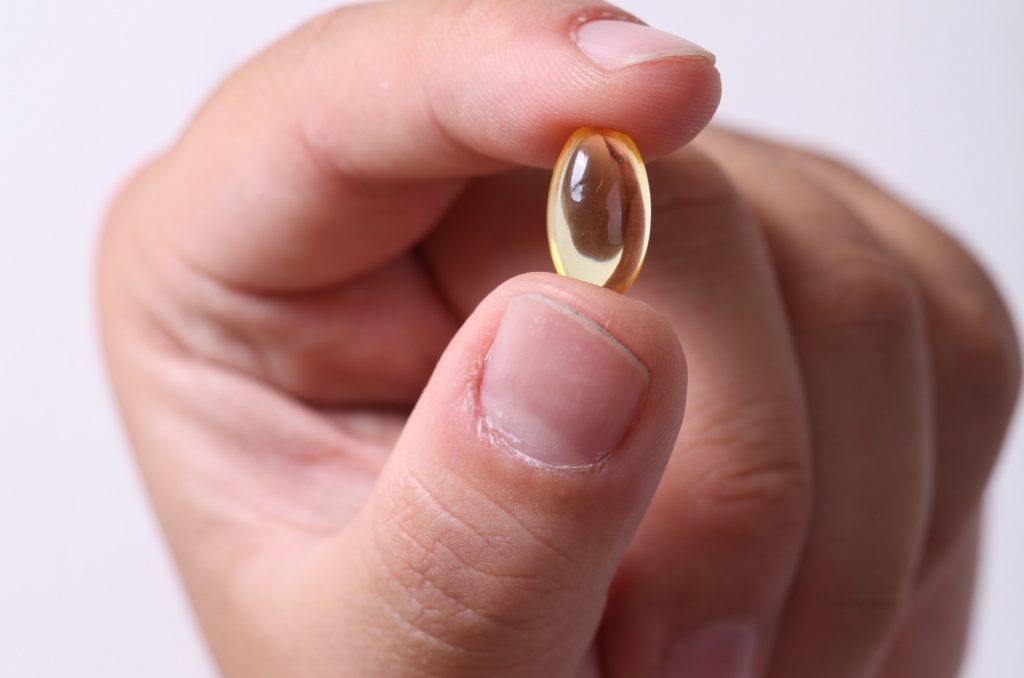Vitamin D for Heart Health

Vitamin D deficiency is a risk factor for cardiovascular disease. Low vitamin D levels lead to high blood pressure, diabetes, intima-media thickness, and coronary calcification.
Cellular vitamin D receptors are found to affect inflammation, suggesting vitamin D may not only impact risk factors contributing to heart disease but may also directly impact on heart disease.
How much vitamin D do you need?
The Food and Nutrition Board (FNB) develops Dietary Reference Intakes (DRIs), which are broken down into Recommended Dietary Allowance (RDA), Adequate Intake (AI), and Tolerable Upper Intake Level (UL).
We use these established DRIs to know how to of a nutrient to include in our diet daily for optimal health.
The FNB recommends 600 IU of vitamin D daily for men and women between the ages of 19-71 years-old.
What happens if you get too little vitamin D?
A study conducted at the University of Copenhagen reviewed data from studies with more than 10,000 participants comparing those with low vitamin D levels (less than 15 ng/mL) versus the highest levels (more than 50 ng/mL). Those with low levels were 64% more likely to have a heart attack, 40% more likely to develop ischemic heart disease, had a 57% increased risk of early death, and 81% more likely to die from heart disease.
What happens if you get too much vitamin D?
The UL for vitamin D is set at 4,000 IUs per day. Intakes above this level are connected to elevated serum levels that increase risk for adverse health effects. Long-term intakes above the UL increases risk for cardiovascular events, such as heart attack.
How to include vitamin D every day:
Obtaining needed nutrients in your diet is always preferable to supplements. However, vitamin-D rich foods are limited.
So, what can you do to ensure you receive 600 IU of vitamin D daily?
Foods rich in vitamin-D include:
Fatty fish, such as salmon, tuna, and mackerel are top sources of vitamin D.
Most milk in the United States (US) is fortified with vitamin D. Note: Cheese and ice cream are not fortified with vitamin D.
Cod liver oil contains 1300 IU’s of vitamin D. This is twice the RDA, but does not exceed the UL.
One of the best vitamin D sources is not found in the grocery store.
Sunlight.
Twenty to twenty-five minutes of sun exposure without sunscreen allows your body to produce vitamin D. However, where you live impacts whether or not sunlight is adequate.
If you live above the 40th degree latitude (i.e. North of Denver, CO) sunlight is not adequate during January and February. If you live above the 42nd degree latitude (i.e. North of Chicago, IL) sunlight is not adequate between November and February.
For more information on foods and diet to lower cholesterol and promote heart health, sign up for my free e-course How to Lower Cholesterol in 8 Simple Steps HERE.
All the best,
Lisa Nelson RD
Health Pro for HealthCentral
Add Mushrooms to Your Diet to Reduce Heart Disease Risk
 More research is linking vitamin D deficiency as a risk factor for heart disease.
More research is linking vitamin D deficiency as a risk factor for heart disease.
Not truly a vitamin, Vitamin D acts as a hormone that regulates over 200 genes. Some functions of vitamin D include:
- Aids in absorption of calcium within in intestinal track
- Necessary for blood clotting
- Aids in secretion of insulin from the pancreas to regular blood sugar levels
- Stimulates mineralization of bone cells
- Necessary for thyroid function
What causes vitamin D deficiency?
Continue reading
Reduce Heart Disease Risk with “Meatless Mondays”
 The Meatless Monday program is associated with the John Hopkins’ Bloomberg School of Public Health. This program advocates that you can make a positive impact on your health by decreasing your meat intake once a week.
The Meatless Monday program is associated with the John Hopkins’ Bloomberg School of Public Health. This program advocates that you can make a positive impact on your health by decreasing your meat intake once a week.
The Dietary Guidelines for Americans in 2010 even included a section on vegetarian diets, indicating that vegetarian style eating patterns are associated with lower levels of obesity, decreased cardiovascular disease risk, lower blood pressure and reduced total mortality. The 2010 Dietary Guidelines focus on a diet rich in legumes, vegetables, fruits, whole grains, nuts/seeds, with moderate amounts of lean meats, eggs, and dairy.
Notice that this focus is similar to recommendations of the DASH Diet (Dietary Approaches to Stop Hypertension) to lower blood pressure. Those who follow a vegetarian diet tend to have healthier weights and lower intakes of saturated fat and cholesterol.
Are Plant Based Meals Nutritionally Adequate?
Continue reading
4 Nutrients to Prevent Heart Disease
 You can use nutrients now to prevent heart disease later. Here are 4 nutrients to ensure are a regular part of your daily diet.
You can use nutrients now to prevent heart disease later. Here are 4 nutrients to ensure are a regular part of your daily diet.
Coenzyme Q10
Coenzyme Q10 (ubiquinone) is a powerful antioxidant and plays a key role in cellular energy production. Within the cellular mitochondria, coenzyme Q10 is responsible for carrying the electrons back and forth between enzymes in the production of ATP (energy).
Coenzyme Q10 also removes many free radicals from circulation. It’s these free radicals that lead to oxidation of LDL and the subsequent chain of events that result in heart disease.
Continue reading
5 Steps to Prevent Heart Disease
 Heart disease is a lifestyle disease. Your diet and lifestyle choices are a major factor in determining your likelihood of developing heart disease.
Heart disease is a lifestyle disease. Your diet and lifestyle choices are a major factor in determining your likelihood of developing heart disease.
Heart disease develops as a result of inflammation and oxidative damage. So, let’s cover steps you can take to decrease inflammation and oxidative damage to reduce your risk of developing heart disease.
1. Decrease your sugar intake.
When I say sugar, I’m also referring to simple carbohydrates. When you consume carbohydrates the body breaks them down into sugar molecules. Converting simple carbs (i.e. refined carbohydrates) into sugar is a fairly quick process for the body. Simple carbohydrates include potatoes, pasta, bread, and rice, along with your sugar sweetened beverages, candy, and sweets. As these foods are broken down, sugar enters the blood steam and can result in blood sugar spikes. These spikes contribute to oxidative damage and inflammation.
Does Vitamin D Deficiency Increase Cardiovascular Risk?

Vitamin D deficiency is fairly common. Vitamin D is not actually a vitamin, but a hormone the body produces from sunlight.
According to a review of existing research there is evidence low vitamin D levels impact cardiovascular disease risk, specifically blood pressure, insulin resistance, and coronary artery disease. The review of around 75 mostly observational studies was published in the Journal of the American College of Cardiology.
Whether or not taking supplemental vitamin D will reduce cardiovascular risks or how much is needed to be effective is still to be determined. We now need more randomized control research studies to examine the impact of high dose Vitamin D supplementation to weigh the pros against the cons.
Daily Vitamin D Recommendation



